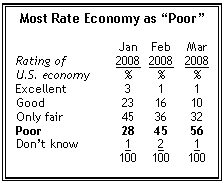
Public views of the American economy have grown increasingly negative over the past few months, and a majority now describes the country’s economic situation as poor. Since January, the percentage of Americans rating the economy as poor has doubled, from 28% to 56%. Meanwhile, only 11% say the economy is excellent or good, down from 26% just two months ago. To find comparably negative assessments, one must go back 15 years to August 1993, when only 10% of Americans rated the economy as excellent or good in a Gallup survey.
Much of the change over the last two months has taken place among Republicans. Throughout most of President Bush’s time in office there has been a large partisan gap on the state of the U.S. economy, with most Democrats and independents offering negative assessments of the economy, and most Republicans offering positive assessments. As recently as last June, 56% of Republicans said the economy was in excellent or good shape, compared with 20% of Democrats and 30% of independents.
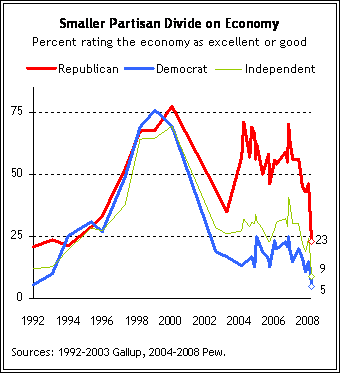
However, Republican views have soured considerably, particularly in the past two months. In January, 46% of Republicans rated the economy as excellent or good, compared with only 23% today.
In addition, the already low ratings among Democrats and independents have continued to slide. Today, only 5% of Democrats believe the economy is in excellent or good shape, down from 15% in January. Just 9% of independents give the economy positive marks, down from 24% two months ago. The gap in Republican and Democratic evaluations of the economy is smaller today than it has been in five years. There are greater partisan differences in views about the severity of the nation’s financial problems. Over half (56%) of Americans believe the U.S. is currently in a recession, and another 15% say the country is in a depression. Fully 82% of Democrats say the nation is either in a recession (63%) or a depression (19%); as do seven-in-ten independents. Republicans offer far less dire assessments of the economic situation. While a slim majority of Republicans (55%) say the nation is in recession or depression, 20% say we are just having a few problems, and 23% say the economy is in excellent or good shape.


As views of the current economic situation have dimmed, there has been an increase in the proportion saying that the economy will improve over the next year. Currently, a third says the economy a year from now will be better than it is today; 39% say it will be about the same as it is now; and 22% say it will be worse. In January, there was less economic optimism, as just 20% expected conditions a year from now to be better than they are today.
Growing Dissatisfaction with Country’s Direction
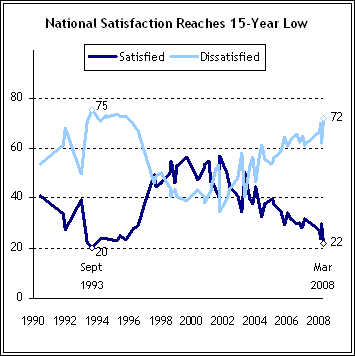
The public’s increasingly grim views of the economy are reflected in assessments of the country’s overall direction. Just 22% of Americans are satisfied with the way things are going in the country, the lowest percentage observed in any Pew Research Center survey since the fall of 1993.
Republican opinion on this question has changed significantly in recent months. In late December of last year, Republicans were about equally likely to say they were satisfied (47%) with the country’s direction as they were to say they were dissatisfied (48%); today, however, a solid 56% majority of Republicans say they are dissatisfied with the nation’s course, while only 40% are satisfied.
Personal Finances Stable
Deepening concerns about the nation’s economic health have not translated into more negative assessments of personal finances. As in January, Americans are roughly divided between those who rate their personal finances as only fair or poor (51%) and those who say they are excellent or good (47%).
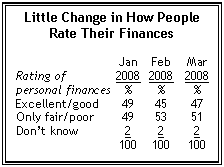
Looking to the future, most Americans (55%) believe their personal financial situation will improve over the next year, down only slightly from January, when 60% said their finances would improve. Meanwhile, 27% currently expect their finances to get worse, up slightly from 22% in January.
Unsurprisingly, assessments of current financial situations vary considerably by income level. For instance, 84% of those with household incomes of $100,000 or more say they are in excellent or good financial shape, compared with only 20% of those making less than $30,000. However, there is little variation among income groups regarding the future. Nearly two-thirds (64%) of those earning at least $100,000 expect their financial situation to improve, but they are only marginally more optimistic than those with incomes below $30,000, 58% of whom believe they will be better off one year from now.
Inflation is Biggest Personal Economic Concern
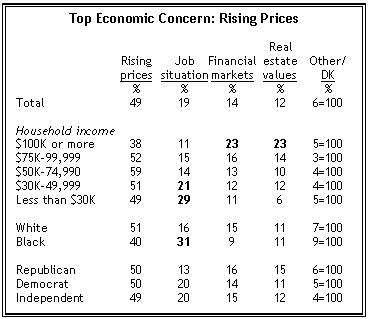
Rising prices top the list when it comes to Americans’ personal economic concerns. Nearly half (49%) cite higher prices as the economic issue they are most worried about. By comparison, just 19% cite the job situation, 14% point to problems in the financial markets, and 12% say declining real estate values.
Majorities or pluralities of Americans across a broad spectrum – regardless of age, income or other personal characteristics – point to inflation as their top financial worry. There is, however, some variation in perceptions of the severity of other problems. For example, the job situation is mentioned far more frequently as a top economic concern by blacks (31%) than whites (16%). Similarly, those with household incomes of under $30,000 annually are the most likely of any income group to rate jobs as a top concern (29%), though prices remain their most widespread concern (49%).
Concern about problems in the financial markets and declining real estate values peak among Americans with household incomes of $100,000 or more. Nearly a quarter (23%) of this group rates each of these issues as the top concern from their own perspective. A plurality of the highest-income group lists rising prices at their top concern, but at 38%, the proportion citing inflation is much smaller than it is for lower-income groups.
There is little division of opinion about the top economic problem across partisan lines. About half of Republicans, Democrats and independents alike say rising prices are their biggest personal financial worry.
Age plays a role where real estate worries are concerned: 16% of 30-49-year-olds say this is their biggest economic worry, far more than the proportion younger adults (8%) or older adults (10%).
Low Marks for Government’s Handling of Investment Crisis
More than three-quarters of Americans have heard at least a little about the problems in the financial markets involving investment banks (47% a lot, 33% a little). Of those who have heard about the problems, 80% say the government has done only a fair job or a poor job addressing problems in the nation’s financial markets.
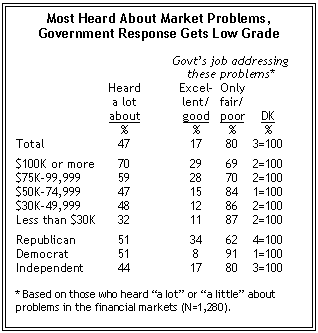
Awareness of the investment banking issue is almost universal among those with the highest household incomes; 95% of those from households with incomes of $100,000 or more had heard at least a little about the situation – 70% have heard a lot, 25% a little. Knowledge falls off with income, such that only 68% of those from households with incomes of less than $30,000 have heard about the investment banking problems, and less than one third (32%) have heard a lot. More than eight-in-ten Republicans and the same proportion of Democrats (83%) have heard about the situation, as well as 81% of independents.
Of those who have heard about the financial market problems, higher-income groups also are more positive in their judgments of government efforts; still, seven-in-ten of those in households with incomes of $75,000 or more say the government is doing a fair or poor job handling this issue. More than eight-in-ten in each of the lower-income groups say the same.
Democrats are far harsher in their assessments of the government’s response to the financial crisis than are independents or Republicans. More than nine-in-ten Democrats (91%) say the government is doing only a fair job or a poor job in addressing the market issues, a judgment shared by 70% of independents and 62% of Republicans.
Bernanke Still Not Well Known

Most Americans don’t know who Federal Reserve Chairman Ben Bernanke is, despite his leading role in the government’s response to the investment banking crisis; 56% say they have not heard of him or do not know enough about him to offer an opinion. Those who are familiar enough with Bernanke to offer an opinion of him are divided: About a quarter (24%) hold a favorable opinion of him, while 20% offer an unfavorable rating.
Three times as many Republicans give a favorable rating to Bernanke as give an unfavorable one (36% versus 12%). Democrats and independents are much more evenly split, leaning slightly toward unfavorable views of the Federal Reserve chairman.
Bernanke fares better with those who know about recent problems with investment banks. Among those who know a lot about the situation, 37% hold favorable views of Bernanke, though 40% still do not offer an opinion. Only 6% of those who know nothing of the investment banking problems give Bernanke a favorable rating, while 82% give no rating at all.




